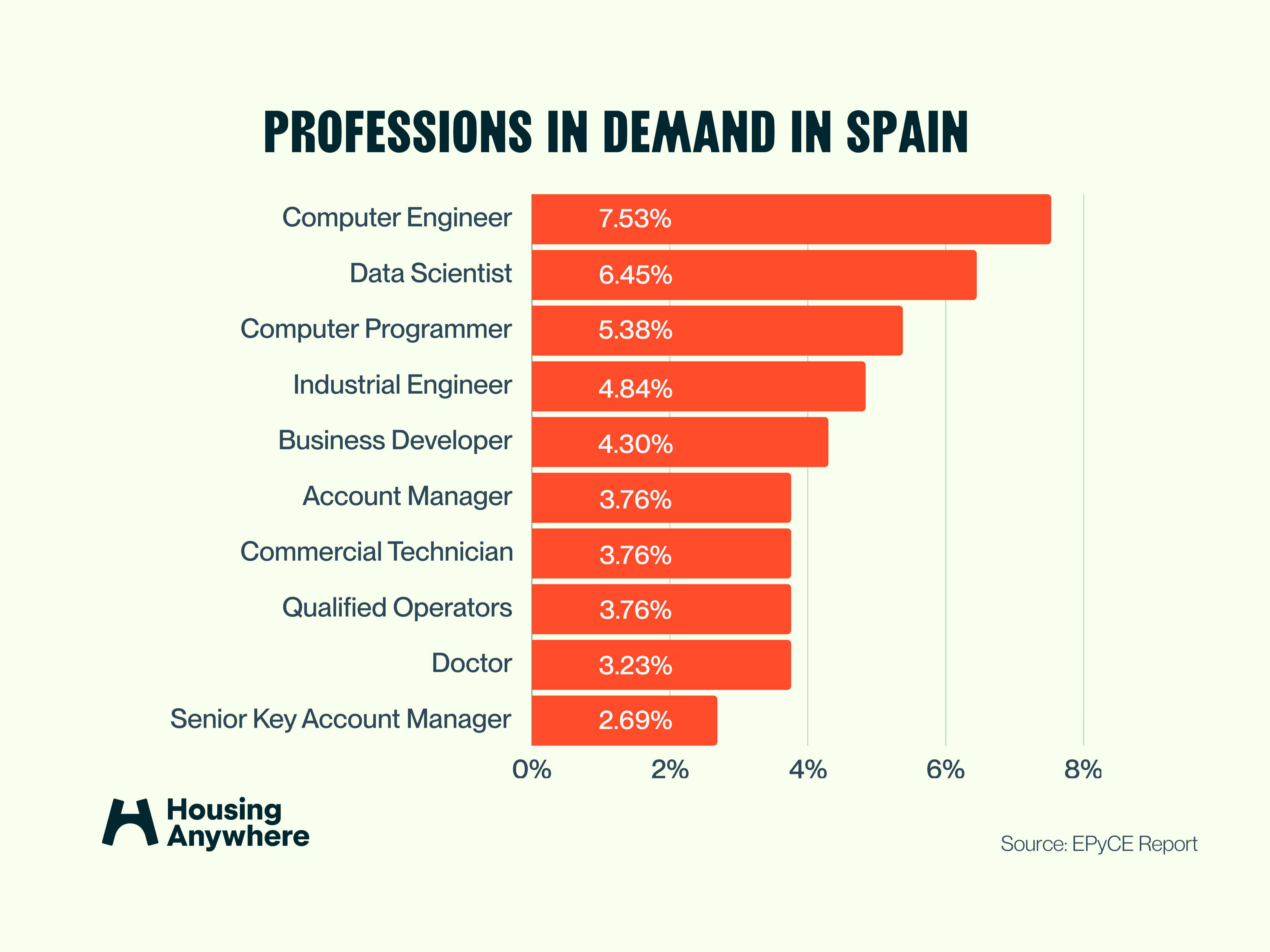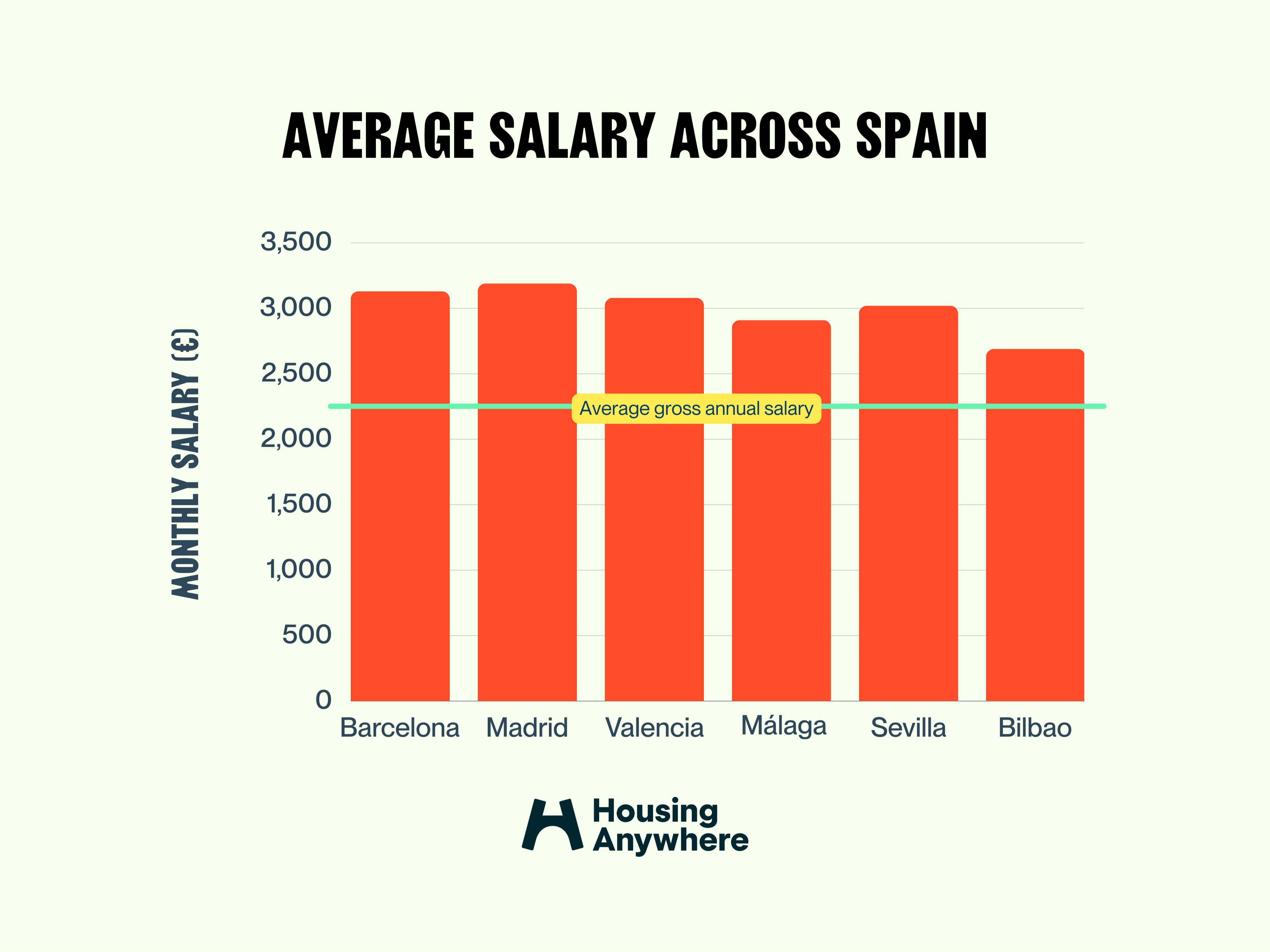The complete guide to the average salary in Spain (2024)
The average salary in Spain comes to € 2,710 gross per month. But what factors influence the salary in Spain?
Marle
Working expats who want to move to Spain need a Spanish work visa in order to legally reside and work here. But to get a work visa, you need to have an offer from a company in Spain. But how do you know if the offer is good?
This article will help you negotiate for a better offer or a raise by understanding:
- The minimum salary in Spain
- The average salary in Spain in 2024
- A good salary to live comfortably
- Average salaries across the industries
- And what factors influencer your salary

Is Spain a good place to work?
Although Spain has the highest youth unemployment rate and a comparatively low average salary within the EU, it continues to be an attractive place for expats.
Of the many reasons to move to Spain, young expats are attracted to the high quality of life, good work-life balance, and cheaper cost of living. So once expats get a well-paying job in Spain, the benefits of life in Spain outweigh the time it takes to find a relevant job for English speakers.
The biggest and the best cities in Spain are great places to work as they have a big expat network and much more job opportunities for English speakers. So if you’re looking for a job, we recommend looking at the main Spanish cities and then applying at one of the top companies in Spain that offer a working visa to foreigners.
What's the minimum salary in Spain in 2024?
As of 2024, the minimum salary in Spain is €1,323 per month for a full-time employee working 40 hours a week. The minimum wage per hour in Spain is €8.87. For those receiving wages over 14 payments, the minimum monthly salary amounts to €1,134, with two additional payments in July and December. This totals to an annual income of €15,876. This reflects a 5% increase in the minimum wage since 2023.
Most companies in Spain make 14 payments in a year-12 monthly payments plus an additional payment in July and in December.
With these levels, Spain has the 8th highest minimum wage (salario mínimo interprofessional or SMI) out of 22 European countries. Since 2008, the minimum monthly salary in Spain grew by about 54%.
Do interns get minimum wage in Spain?
Unfortunately, this minimum wage doesn't always apply to interns in Spain. If you’re still studying in Spain, you’ll most likely be compensated a maximum of €300 for travel or lunch. But if you’ve graudated and are undertaking an extracurricular internship, you should get at least minimum wage.
What is the average salary in Spain in 2024?
In 2024, the average salary in Spain is €2,250 gross per month or €27,000 per year. Since this represents the average, 25% of the population makes less than €1,600 and 75% earns less than €7,080.
When compared to other European countries, Spain’s average net salary sits in the middle.
| Country | Average Net Salary | Comparison with Spain |
|---|---|---|
| Spain | €1,785 | baseline |
| Netherlands | €2,629 | +47% |
| Germany | €2,565 | +44% |
| Sweden | €2,525 | +41% |
| France | €2,275 | +27% |
| Italy | €1,446 | -20% |
| Estonia | €1,200 | -33% |
| Portugal | €859 | -52% |
| Greece | €742 | -59% |
Although the average salary in Spain is in the middle when compared to the average salary across the 27 European countries, you’ve to remember that Spain’s cost of living is also considerably lower.
What's a good salary for a comfortable life in Spain?

Considering the average cost of living in Spain, a good monthly net salary for a comfortable life in Spain is €2,700 for a single person or €4,000 for someone supporting their family.
For your reference, this is how much you can expect to spend on rent, groceries, health insurance, public transport, and leisure costs per month in Spain:
- €1,100 per month for a single person on a tight budget.
- €1,750 per month for a single person with a moderate budget.
- €2,200 to €2,881 per month for a family with children.
Don’t forget that in Barcelona is expensive and you need to earn more than than in cities such as Màlaga or any suburb. So keep this in mind when negotiating your salary!
The average salary in Spain (per career sector)
Your career choice is the determining factor for your true average salary. In 2024, the high-paying jobs in Spain were for lawyers and doctors. Doctors earned an average monthly salary of € 6,010, while lawyers earned €5,258 euros per month. Here are some other high-paying jobs in Spain and their average salaries.
| Job Title | Average Salary in Spain |
|---|---|
| Accountant | € 2,100 |
| Human Resources Manager | € 4,150 |
| Bank Branch Manager | € 5,125 |
| Business Analyst | € 3,616 |
| Sales Manager | € 4,591 |
| Project Manager | € 3,441 |
| Dentist | € 6,575 |
| Pharmacist | € 3,650 |
But remember, this is just the average salary and that the actual salary you might get or deserve, depends on a variety of factors.
Factors that influence your salary
Needless to say, the average salary only gives you only a benchmark of what you can expect. In the end, your actual gross salary depends on these 6 factors:
- Career field
- Location in Spain
- Nationality
- Experience level
- Level of education
- Gender
1. Your salary varies with your career field.
As you can see from the previous table, the salary you earn in Spain (or anywhere else) heavily depends on which career field you choose.
Some of the highest paying jobs in Spain include:
- Surgeon: €64,500 yearly
- Project manager engineer: €59,900 yearly
- Sales manager: €58,880 yearly
- IT director: €48,000 yearly
Overall, the sectors that pay the highest salaries include banking, insurance, health, engineering, and IT.

As an expat, it’s also good for you to know that some of the most in-demand jobs in Spain are high paying and difficult to fill locally. So if you want to apply for a job in Spain, consider these professions:
- Data scientist
- Computer engineer
- Computer programmer or engineer
- Commercial technician
- Business developer
- Account manager (with multilingual capabilities)
- Doctor
- Qualified operators.

2. The largest cities offer the highest average salaries in Spain

The average salary in Spain varies based on your location. While you will earn an average of €3,130 in the metropolis Barcelona, you can expect an average salary of €2,910 in Málaga.
Don't forget: the cost of living in Barcelona is higher than in Málaga.
| City | Average Salary |
|---|---|
| Barcelona | €3,130 |
| Madrid | €3,190 |
| Valencia | €3,080 |
| Málaga | €2,910 |
| Sevilla | €3,020 |
| Bilbao | €2,690 |
3. Your experience level drives your wage
Your pay rate will increase as you gain work experience. As a guideline, with 2-5 years of work experience, you’ll earn an average of 32% more than an entry-level employee. With more than 5 years of experience, you can expect a raise of 36% and with 10+ years of experience, a 21% raise.
4. Your Non-EU status can be beneficial
In general, non-EU expats tend to earn more than the average annual salary as they need a work visa. Since a work visa is granted to those who’re filling a job on the shortage list, you’re in high demand. In other words, since the government cannot favour local employees to help the country’s unemployment situation, it translates to a higher salary for expats.
Alternatively, highly skilled or educated expats can also apply for the highly skilled worker visa which has a minimum salary requirement of €55,142 a year for managers or directors and €40,077 a year for scientists.
Either way, expats can earn higher average salaries than locals as they’re in demand for fulfilling hard to fill positions.
5. Your level of education sets the tone
In some sectors or for some professions, a higher education matters a lot. If you believe a higher education makes you a better candidate, then you can use your level of education as an argument for your salary in a job interview.
Take these figures as a reference for your monthly income:
| Education Level | Higher salary in % |
|---|---|
| Diploma or certificate | + 17% more than high school diploma |
| Bachelor's Degree | + 24% more than with certificate only |
| Master's degree | + 29% more than Bachelor's Degree |
| PhD | + 23% more than Master's Degree |
6. Your gender still shapes your salary
Even though it's 2024 Spain is still behind in getting gender pay equality. Unfortunately gender continues to negatively influence salary in Spain and women earn on average 4% less than their male counterparts.
| Gender | Average Gross Salary |
|---|---|
| Male | €2,770 |
| Female | €2,660 |
Don't use this factor as an indicator to settle on your gender-determined salary. Instead, use it as an incentive to get to the same level as men as a woman.
Want to know more about Moving to Spain? Download the free e-book by filling out the form below.
This article is for informational purposes only.
Please reach out to content @housinganywhere.com if you have any suggestions or questions about the content on this page. For legal advice or help with specific situations, we recommend you contact the appropriate authorities.
Related articles
In this article
Moving to Spain?
Find accommodation in cities across Spain. Book the place of your dreams from verified landlords even before relocating!
Search Now
